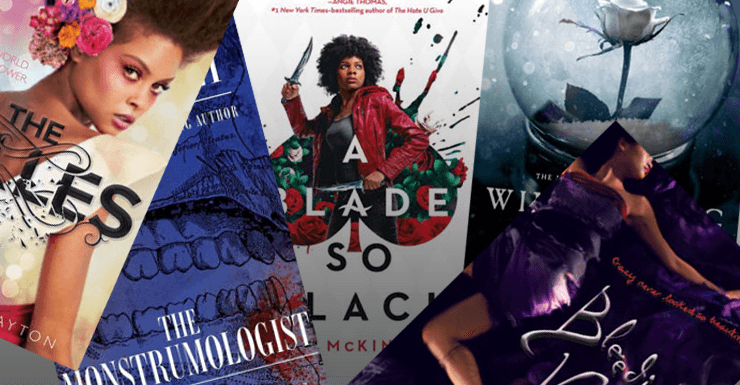As a novelist and a madwoman, I’ve often felt that reality is overrated. Why slog through the mundanity of the everyday when you could be nose-deep in a book instead? Perhaps naturally, fantasy is my favorite genre, with all those new and fascinating made-up worlds mined and forged from the material in their creator’s heads. And within fantasy, there is something particularly delicious to me about discovering a crazy character. Someone a bit like me.
Let’s face it. Many of us see the world a little differently from most other people, and we often find that our choices, actions, and personal stories are influenced by our own mental illnesses. So I am always fascinated by how an unconventional mind works within and upon an unconventional world. It’s like insanity inception!
These five books are great examples of the way mentally ill characters fit and function in the fantastical. And while I know they say the definition of madness is doing the same things over and over again and expecting different results, I’ve definitely read all of these books more than once, and I find something new to enjoy every time.
Bleeding Violet by Dia Reeves
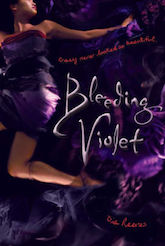 After her aunt’s attempt to hospitalize her against her will, Hanna flees to Portero, a crazy town where doorways to other worlds open up to let bloodthirsty monsters in. Hanna herself, an unmedicated bipolar girl dealing with hallucinations and violent mania, is a beautifully written unreliable narrator with a dark sense of humor. The hedonism and the macabre fascinations familiar to many who share her disorder drive her choices, which push the plot forward briskly as Hanna tries to prove herself to a mother who wants nothing to do with her. These family dynamics might be very familiar for too many people living with mental illness, but in this case, there are deep machinations afoot. Bleeding Violet is a fabulous example of a book that can only exist because the main character is mad.
After her aunt’s attempt to hospitalize her against her will, Hanna flees to Portero, a crazy town where doorways to other worlds open up to let bloodthirsty monsters in. Hanna herself, an unmedicated bipolar girl dealing with hallucinations and violent mania, is a beautifully written unreliable narrator with a dark sense of humor. The hedonism and the macabre fascinations familiar to many who share her disorder drive her choices, which push the plot forward briskly as Hanna tries to prove herself to a mother who wants nothing to do with her. These family dynamics might be very familiar for too many people living with mental illness, but in this case, there are deep machinations afoot. Bleeding Violet is a fabulous example of a book that can only exist because the main character is mad.
The Belles by Dhonielle Clayton
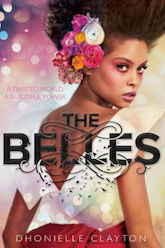 Oh how I love a good narcissist! (At least, in fiction.) Princess Sophia is a perfect foil for a world obsessed with beauty. Her self-centeredness, rage, and feelings of infallibility drive all of her actions, and her inability to see anything from anyone else’s point of view prevent any limitations to her whims and demands. Thematically, The Belles touches on the dichotomy between ugliness and loveliness, and while I can’t give away too much lest I risk spoiling the unfolding mysteries of this intricate plot, I can guarantee that as you read Camellia’s story, you will feel awe at watching what a true narcissist can dream up.
Oh how I love a good narcissist! (At least, in fiction.) Princess Sophia is a perfect foil for a world obsessed with beauty. Her self-centeredness, rage, and feelings of infallibility drive all of her actions, and her inability to see anything from anyone else’s point of view prevent any limitations to her whims and demands. Thematically, The Belles touches on the dichotomy between ugliness and loveliness, and while I can’t give away too much lest I risk spoiling the unfolding mysteries of this intricate plot, I can guarantee that as you read Camellia’s story, you will feel awe at watching what a true narcissist can dream up.
The Monstrumologist by Rick Yancey
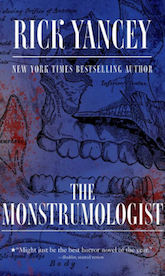 The titular character in this gothic horror fantasy series is a 19th century American doctor who studies monsters. He’s also recognizably bipolar, careening from epic delusions of grandeur to piteous bed-bound moans about no one will remember his name when he’s gone. His mood swings control his life and thus, the life of his ward, Will Henry, who suffers from PTSD due to the death of his parents—for which the Monstrumologist is also to blame. Through Will’s eyes, we learn about the strange, macabre world of monstrumology as practiced by a madman: sudden midnight journeys, feverish weeks spent obsessed by a dissection, mail from prestigious peers left to pile up on the desk. The highs and lows of the doctor’s disorder echo the joy and horror of scientific discovery and the monstrous nature of humanity itself.
The titular character in this gothic horror fantasy series is a 19th century American doctor who studies monsters. He’s also recognizably bipolar, careening from epic delusions of grandeur to piteous bed-bound moans about no one will remember his name when he’s gone. His mood swings control his life and thus, the life of his ward, Will Henry, who suffers from PTSD due to the death of his parents—for which the Monstrumologist is also to blame. Through Will’s eyes, we learn about the strange, macabre world of monstrumology as practiced by a madman: sudden midnight journeys, feverish weeks spent obsessed by a dissection, mail from prestigious peers left to pile up on the desk. The highs and lows of the doctor’s disorder echo the joy and horror of scientific discovery and the monstrous nature of humanity itself.
A Blade So Black by L. L. McKinney
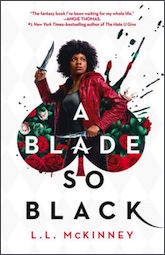 The Mad Hatter gets an update in this urban fantasy retelling of Alice of Wonderland, in which a black girl from Atlanta ventures into a dark dream realm to slay Nightmares. Hatta is Alice’s mysterious and handsome mentor, struggling with PTSD from a war with the Queen. The effects of his trauma inform his brooding nature, and cause him to avoid conversations concerning important facts that come back to bite Alice later. But when he’s poisoned, we get to watch his support system swing into action as Alice dives deeper into Wonderland to find a cure. (Sidenote: I love well written support systems for mentally ill people in fiction. We all deserve friends and supporters as ass-kicking as Alice.)
The Mad Hatter gets an update in this urban fantasy retelling of Alice of Wonderland, in which a black girl from Atlanta ventures into a dark dream realm to slay Nightmares. Hatta is Alice’s mysterious and handsome mentor, struggling with PTSD from a war with the Queen. The effects of his trauma inform his brooding nature, and cause him to avoid conversations concerning important facts that come back to bite Alice later. But when he’s poisoned, we get to watch his support system swing into action as Alice dives deeper into Wonderland to find a cure. (Sidenote: I love well written support systems for mentally ill people in fiction. We all deserve friends and supporters as ass-kicking as Alice.)
Wintersong by S. Jae-Jones
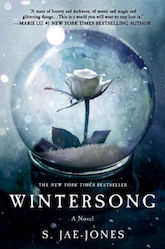 In a fairy-tale Bavaria, Liesl, a talented bipolar songwriter, must travel to the underworld to rescue her sister who has been kidnapped by the musically-inclined Goblin King. There is some scientific evidence (and a lot of speculation) that bipolar disorder and creativity is linked, and this book handles that idea beautifully. Mania and hedonism are certainly linked, and the book dives headfirst into lush physical pleasure as well. To top it off, a long depression robs Liesl of precious time in the underworld, and as days slip by, her sister is closer to being lost forever. I adore how Liesl has to wrestle with her own nature as much as she does against the machinations of the Goblin King.
In a fairy-tale Bavaria, Liesl, a talented bipolar songwriter, must travel to the underworld to rescue her sister who has been kidnapped by the musically-inclined Goblin King. There is some scientific evidence (and a lot of speculation) that bipolar disorder and creativity is linked, and this book handles that idea beautifully. Mania and hedonism are certainly linked, and the book dives headfirst into lush physical pleasure as well. To top it off, a long depression robs Liesl of precious time in the underworld, and as days slip by, her sister is closer to being lost forever. I adore how Liesl has to wrestle with her own nature as much as she does against the machinations of the Goblin King.
 Heidi Heilig is an author and activist living mostly in Brooklyn and occasionally in her own head. Her books include the acclaimed Girl From Everywhere series and the upcoming For a Muse of Fire.
Heidi Heilig is an author and activist living mostly in Brooklyn and occasionally in her own head. Her books include the acclaimed Girl From Everywhere series and the upcoming For a Muse of Fire.










